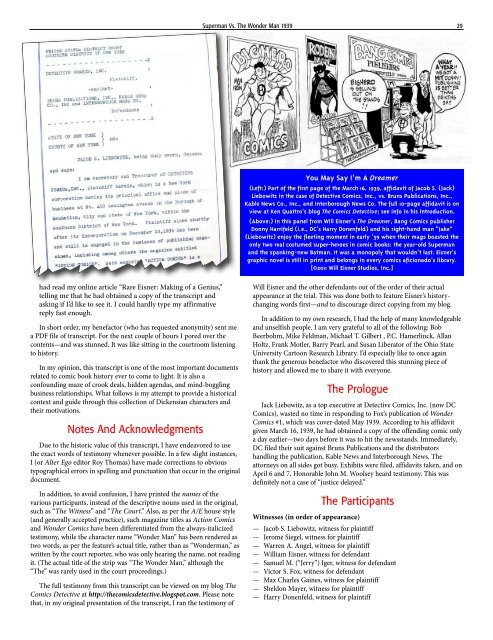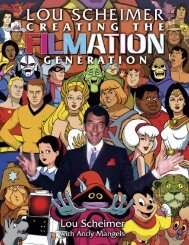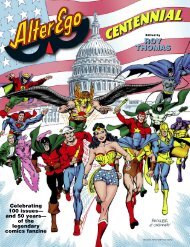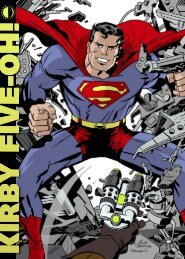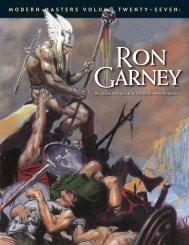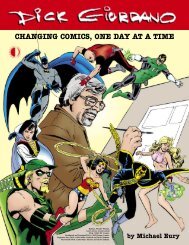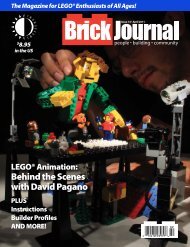The Education Of Victor Fox - TwoMorrows
The Education Of Victor Fox - TwoMorrows
The Education Of Victor Fox - TwoMorrows
Create successful ePaper yourself
Turn your PDF publications into a flip-book with our unique Google optimized e-Paper software.
Superman Vs. <strong>The</strong> Wonder Man 1939 29<br />
You May Say I’m A Dreamer<br />
(Left:) Part of the first page of the March 16, 1939, affidavit of Jacob S. (Jack)<br />
Liebowitz in the case of Detective Comics, Inc., vs. Bruns Publications, Inc.,<br />
Kable News Co., Inc., and Interborough News Co. <strong>The</strong> full 10-page affidavit is on<br />
view at Ken Quattro’s blog <strong>The</strong> Comics Detective; see info in his Introduction.<br />
(Above:) In this panel from Will Eisner’s <strong>The</strong> Dreamer, Bang Comics publisher<br />
Donny Harrifeld (i.e., DC’s Harry Donenfeld) and his right-hand man “Jake”<br />
(Liebowitz) enjoy the fleeting moment in early ’39 when their mags boasted the<br />
only two real costumed super-heroes in comic books: the year-old Superman<br />
and the spanking-new Batman. It was a monopoly that wouldn’t last. Eisner’s<br />
graphic novel is still in print and belongs in every comics aficionado’s library.<br />
[©2011 Will Eisner Studios, Inc.]<br />
had read my online article “Rare Eisner: Making of a Genius,”<br />
telling me that he had obtained a copy of the transcript and<br />
asking if I’d like to see it. I could hardly type my affirmative<br />
reply fast enough.<br />
In short order, my benefactor (who has requested anonymity) sent me<br />
a PDF file of transcript. For the next couple of hours I pored over the<br />
contents—and was stunned. It was like sitting in the courtroom listening<br />
to history.<br />
In my opinion, this transcript is one of the most important documents<br />
related to comic book history ever to come to light. It is also a<br />
confounding maze of crook deals, hidden agendas, and mind-boggling<br />
business relationships. What follows is my attempt to provide a historical<br />
context and guide through this collection of Dickensian characters and<br />
their motivations.<br />
Notes And Acknowledgments<br />
Due to the historic value of this transcript, I have endeavored to use<br />
the exact words of testimony whenever possible. In a few slight instances,<br />
I (or Alter Ego editor Roy Thomas) have made corrections to obvious<br />
typographical errors in spelling and punctuation that occur in the original<br />
document.<br />
In addition, to avoid confusion, I have printed the names of the<br />
various participants, instead of the descriptive nouns used in the original,<br />
such as “<strong>The</strong> Witness” and “<strong>The</strong> Court.” Also, as per the A/E house style<br />
(and generally accepted practice), such magazine titles as Action Comics<br />
and Wonder Comics have been differentiated from the always-italicized<br />
testimony, while the character name “Wonder Man” has been rendered as<br />
two words, as per the feature’s actual title, rather than as “Wonderman,” as<br />
written by the court reporter, who was only hearing the name, not reading<br />
it. (<strong>The</strong> actual title of the strip was “<strong>The</strong> Wonder Man,” although the<br />
“<strong>The</strong>” was rarely used in the court proceedings.)<br />
<strong>The</strong> full testimony from this transcript can be viewed on my blog <strong>The</strong><br />
Comics Detective at http://thecomicsdetective.blogspot.com. Please note<br />
that, in my original presentation of the transcript, I ran the testimony of<br />
Will Eisner and the other defendants out of the order of their actual<br />
appearance at the trial. This was done both to feature Eisner’s historychanging<br />
words first—and to discourage direct copying from my blog.<br />
In addition to my own research, I had the help of many knowledgeable<br />
and unselfish people. I am very grateful to all of the following: Bob<br />
Beerbohm, Mike Feldman, Michael T. Gilbert , P.C. Hamerlinck, Allan<br />
Holtz, Frank Motler, Barry Pearl, and Susan Liberator of the Ohio State<br />
University Cartoon Research Library. I’d especially like to once again<br />
thank the generous benefactor who discovered this stunning piece of<br />
history and allowed me to share it with everyone.<br />
<strong>The</strong> Prologue<br />
Jack Liebowitz, as a top executive at Detective Comics, Inc. (now DC<br />
Comics), wasted no time in responding to <strong>Fox</strong>’s publication of Wonder<br />
Comics #1, which was cover-dated May 1939. According to his affidavit<br />
given March 16, 1939, he had obtained a copy of the offending comic only<br />
a day earlier—two days before it was to hit the newsstands. Immediately,<br />
DC filed their suit against Bruns Publications and the distributors<br />
handling the publication, Kable News and Interborough News. <strong>The</strong><br />
attorneys on all sides got busy. Exhibits were filed, affidavits taken, and on<br />
April 6 and 7, Honorable John M. Woolsey heard testimony. This was<br />
definitely not a case of “justice delayed.”<br />
<strong>The</strong> Participants<br />
Witnesses (in order of appearance)<br />
— Jacob S. Liebowitz, witness for plaintiff<br />
— Jerome Siegel, witness for plaintiff<br />
— Warren A. Angel, witness for plaintiff<br />
— William Eisner, witness for defendant<br />
— Samuel M. (“Jerry”) Iger, witness for defendant<br />
— <strong>Victor</strong> S. <strong>Fox</strong>, witness for defendant<br />
— Max Charles Gaines, witness for plaintiff<br />
— Sheldon Mayer, witness for plaintiff<br />
— Harry Donenfeld, witness for plaintiff


